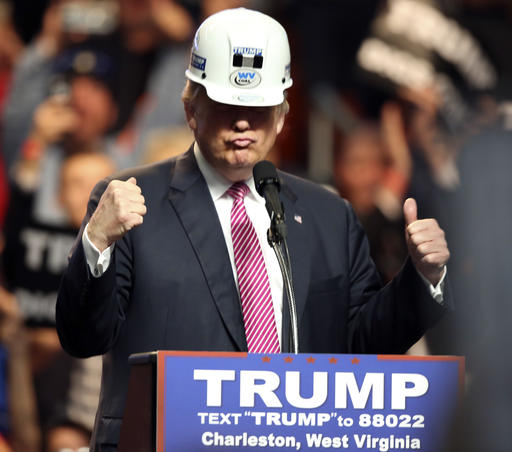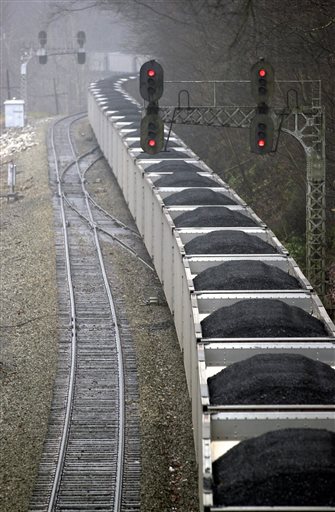Election Day 2016 in the coalfields
November 8, 2016 by Ken Ward Jr.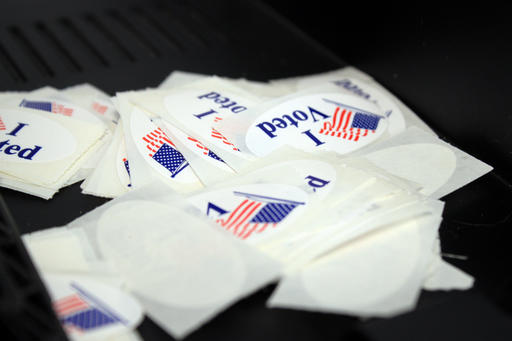
Eighteen months ago, when billionaire Jim Justice announced his run for governor, I wrote a blog post called “Coalfield Justice: West Virginia needs more than love.” Among other things, I wrote:
Perhaps most importantly, it seems impossible to imagine that a gubernatorial election that features Jim Justice as a candidate will involve the sort of real discussion about coal’s past and our future that West Virginians so desperately need …
At this rate, we’re going to end up with another election that features nonsensical advertising campaigns over which candidate is more pro-coal and more anti-EPA. If the career campaign consultants have their way, every 2016 race in West Virginia will again be about President Obama, who won’t be on the ballot.
For the most part, the fall campaign played out this way. There were some minor bright spots during the May primary, when rival Democrats Jeff Kessler and Booth Goodwin tried to steer the discussion toward the future, rather than some imagined future that is wrapped up in mostly holding onto the past. But we’ve again managed to get through an election cycle by letting the coal industry and its political friends get away with making the campaign about who will do more to save an industry that is in major decline, with little hope of a significant rebound, and with precious little of the discussion focused on how to move forward with hope, not fear.
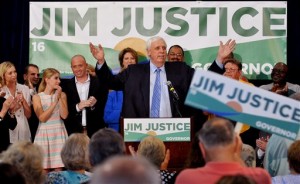 It’s not all Jim Justice’s fault, of course. And some of his opponents have shown a really remarkable bit of hypocrisy, when they go after Justice’s environmental record while most of their campaign is about demonizing the U.S. Environmental Protection Agency.
It’s not all Jim Justice’s fault, of course. And some of his opponents have shown a really remarkable bit of hypocrisy, when they go after Justice’s environmental record while most of their campaign is about demonizing the U.S. Environmental Protection Agency.
But as I wrote back in May 2015, the Justice candidacy created a troubling situation. I’m sure that Justice’s backers (including Sen. Joe Manchin) thought having a coal man on the ballot would insulate the Democrats from all of the anti-Obama, anti-EPA, and “war on coal” nonsense that the Republican career campaign consultants have thrived on in recent elections.
To be fair, at one point, the Justice campaign seemed interested in talking about an important issue like energy efficiency. But clearly, his game was more about promoting the impossible notion that West Virginia would soon be mining more coal than ever before. And when asked about climate change, Justice shows a greater lack of policy depth than even your average West Virginia politician.
What the Justice campaign really did, though, was somehow allow a campaign that turned Justice’s business practices into an issue, in all the wrong ways.
Running up large fines for environmental and safety violations is, as the Don Blankenship case showed us, really part of the business model for the coal industry. While it’s true that Justice seems to have a much bigger habit than other operators of simply not paying off those fines in a timely fashion, the underlying issue — that violating safety and environmental rules is so commonplace and accepted in the mining industry — should be by far the greater concern (interestingly, in fact, the NPR story published toward the end of the campaign reported that Justice mines with delinquent federal fines continue to have worst-than-average safety records, something that was frequently lost in the local retelling of the Howard Berkes story).
With Justice in the race, the focus then became his failure to pay his bills. That’s a perfectly legitimate issue — and one that Justice’s backers, including Sen. Manchin, should have been more concerned about — but shouldn’t we all be focused more on insisting that coal companies follow the law, on saying that any number of violations that put workers and the environment at risk is simply no longer something we’re willing to look the other way for in the name of a few jobs?
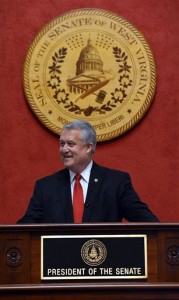 A race for governor between Justice and Senate President Bill Cole (he of the right-to-work legislation and opposition to construction worker prevailing wage) left United Mine Workers President Cecil Roberts unable to do much except insist that Justice was “one of the good coal operators.” Efforts to paint Bill Cole as having weakened state mine safety protections were hindered by the fact that Democratic legislators and Democratic Gov. Earl Ray Tomblin were on board with those bills.
A race for governor between Justice and Senate President Bill Cole (he of the right-to-work legislation and opposition to construction worker prevailing wage) left United Mine Workers President Cecil Roberts unable to do much except insist that Justice was “one of the good coal operators.” Efforts to paint Bill Cole as having weakened state mine safety protections were hindered by the fact that Democratic legislators and Democratic Gov. Earl Ray Tomblin were on board with those bills.
Justice takes one of the problems the West Virginia Democratic Party has and makes it so abundantly clear. Even if you wanted to campaign that the other guy gives too much away to coal, you can’t do it if you are part of that problem or never stand up to it, except in last-minute campaign ads.
Democratic Attorney General candidate Doug Reynolds is another example. Reynolds wants to use the January 2014 Freedom Industries chemical spill somehow against Republican Attorney General Patrick Morrisey. But Reynolds voted in favor of gutting the chemical tank safety bill that was approved after the spill. And Reynolds showed such a lack of understanding about coal and climate change that he just can’t be taken seriously on that issue. At least voters know where AG Morrisey stands on such things: His major campaign pitch is that he’s led the legal fight against EPA’s effort to curb greenhouse gas emissions from coal-fired power plants. He says questions about climate change only “divert attention from the matter at hand.”
Then, of course, there’s Donald Trump. What is there to say that hasn’t been said about this man, this candidate, and the politics he represents? The vision for America that he represents?
Here in West Virginia, it’s worth saying again that hardly any experts on energy issues really believe Trump is going to make the Appalachian coal industry great again. But so many of our leaders are afraid to really say that, afraid to oppose Trump — afraid mostly of the commercials that would be run against them someday if they didn’t go along.
Take Sen. Shelley Moore Capito, R-W.Va. Probably the most enlightening West Virginia news story of this campaign was one that David Gutman wrote for the Gazette-Mail back in July:
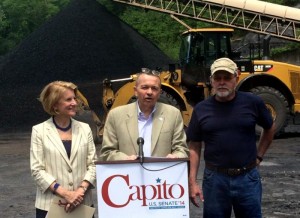 Unlike Donald Trump, Sen. Shelley Moore Capito, R-W.Va., does not think we should ban all Muslims from entering the country.
Unlike Donald Trump, Sen. Shelley Moore Capito, R-W.Va., does not think we should ban all Muslims from entering the country.
She does not agree with Trump’s proposal to pull back American support for members of NATO, an alliance that has been the foundation of European peace and stability since World War II.
She does not think Sen. Ted Cruz’s father had any role in the Kennedy assassination, as Trump has repeatedly insinuated (with zero evidence), and she can’t understand why Trump keeps talking about it.
But Capito wants Trump — a candidate whose proposals range from xenophobic (the Muslim ban) to globally destabilizing (NATO retrenchment) to downright racist (saying a judge can’t do his job because his parents are Mexican) — to be the next president.
It’s obvious that a huge part, probably the primary part, of Sen. Capito’s thinking here has to do with the coal industry, with a downturn that — despite what all the experts say — industry officials continue to paint as being caused mostly by EPA and by President Obama’s efforts to do something about the climate crisis. All those other things — big global things that I’m sure Sen. Capito cares about — but somehow a vote for President of the United States comes back to West Virginia’s coal industry.
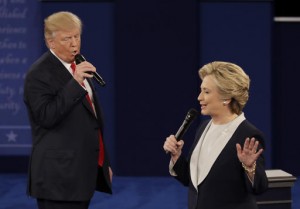 Democratic presidential nominee Hillary Clinton, meanwhile, certainly didn’t make it very easy for anyone who wanted to try to even just nudge the campaign discussion toward finding a future with a far smaller coal industry. We’ve all seen and heard the quotes plenty of times. You can’t escape them. No amount of saying you have a plan for helping out is going to cut through when the other side has that clip to play over and over.
Democratic presidential nominee Hillary Clinton, meanwhile, certainly didn’t make it very easy for anyone who wanted to try to even just nudge the campaign discussion toward finding a future with a far smaller coal industry. We’ve all seen and heard the quotes plenty of times. You can’t escape them. No amount of saying you have a plan for helping out is going to cut through when the other side has that clip to play over and over.
The whole “we’re going to put a lot of coal miners and coal companies out of business” thing was a huge campaign mistake. It fit right into the political theater of this election, and the last election, and the one before that. As long as West Virginians and their media are willing to allow this to be what elections are about, well, then that’s what elections will be about.
There was an interesting story in Sunday’s New York Times, headlined, “Is there life after Trump.” It’s a piece about Republicans confronting what Trump means for their party, win or lose the election. This is the part I found relevant to where West Virginia is politically:
As Margaret Thatcher once said, first you win the argument, then you win the vote. One of the appealing things to me about the Republican Party in the early 1980s, as a young conservative, was that it had become a party of ideas, of governing experiment. But somewhere along the way large numbers of Republicans began to devalue serious ideas. For example, as early as 2013, Gov. Chris Christie of New Jersey, one of Mr. Trump’s most emphatic supporters, said of his fellow Republicans, “I think we’ve had too many people who’ve become less interested in winning an election and more interested in winning an argument.”
Now, I don’t want to come off as too foolish here. Obviously, to get things done in government, one has to win elections. And say what you will about the West Virginia Republicans. They’ve certainly gotten much better at winning elections. I’m not sure anyone would say that for the state’s Democrats, though obviously we’ll see how this campaign season went soon enough.
What we as West Virginians more broadly have not gotten any better at since I started writing this blog (see for example here, here and here for previous Election Day thoughts that sound a lot like today’s) is having the argument in the first place.
This campaign, there’s really been no serious argument — no debate, no discussion, no nothing, really — about what to do about the inevitable decline of the mining industry in the state’s coalfields. Despite the increasingly small portion of our citizens who rely on coal, there was little real discussion about a broad range of other industries and businesses and economic opportunities, ways to try to dig our state out of the hole it’s in and move forward to a stronger future. Questions about all of this get kind of thrown in, and then almost run right over by the need candidates feel to say a pledge of allegiance to coal or face the consequences in negative ads.
It’s important when saying all of that to note that this longer-range discussion is needed not because coalfield concerns aren’t important, not because those communities aren’t suffering. They are suffering and their concerns are real — and the need for a full-court press to help them is vital. Absolutely vital.
But aside from a weak pretense of talking about diversification, the entire talk about coal is about who is more anti-EPA, about who can say the dumbest thing about climate change not being real. And when we do talk about the extent to which coal will continue (because it will continue), we don’t talk at all about pressing matters involved there — like ending black lung disease, avoiding the next mine disaster, doing something about the clear problem of sickness faced by those who live near mountaintop removal mines, about protecting miner pensions and seeing that coal company owners don’t walk away from their growing environmental liabilities.
West Virginia needs a broad campaign, a big discussion, a major effort at tackling all of this, a move to confront our complicated relationship with the coal industry that gets beyond what the career campaign consultants use to win elections. Let’s hope that gets started before it’s too late.

 Subscribe to the Coal Tattoo
Subscribe to the Coal Tattoo

